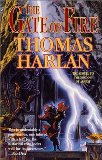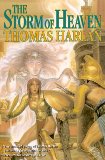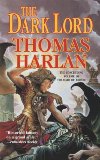 THE OATH OF EMPIRE by Thomas Harlan
THE OATH OF EMPIRE by Thomas Harlan
 The Oath of Empire is a series of four books, namely The Shadow of Ararat, The Gate of Fire, The Storm of Heaven, and The Dark Lord, which is at once a fantasy and an alternate history of the Western and Eastern Roman (Byzantine) Empires, and which is set in the early 7th Century. The alternate history part pre-supposes that Christianity never gained much of a foothold in the Empire, and Constantine was only a rebel, never Emperor, and this fact appears to be the biggest event change to form this alternate history… It also presupposes that the Western Roman Empire was able to withstand the barbarian invasions of the fourth and fifth centuries, and was able to recover its power. The fantastic element is sorcery in the form of the thaumaturges (mages), the healers, and the sorcerers that rise in the story.
The Oath of Empire is a series of four books, namely The Shadow of Ararat, The Gate of Fire, The Storm of Heaven, and The Dark Lord, which is at once a fantasy and an alternate history of the Western and Eastern Roman (Byzantine) Empires, and which is set in the early 7th Century. The alternate history part pre-supposes that Christianity never gained much of a foothold in the Empire, and Constantine was only a rebel, never Emperor, and this fact appears to be the biggest event change to form this alternate history… It also presupposes that the Western Roman Empire was able to withstand the barbarian invasions of the fourth and fifth centuries, and was able to recover its power. The fantastic element is sorcery in the form of the thaumaturges (mages), the healers, and the sorcerers that rise in the story.
 This series was a brilliant idea, as I have always loved alternative history, but I have never before seen it combined with fantasy on such a grand scale. Thomas Thomas Harlan’s pacing of this series is really wonderful. The plot focuses around a war between Rome and Persia, and the consequences of expending your allies in order to achieve ultimate victory. Also mixed in is the rise of Islam, and the influence that the expending of Rome’s allies had on Mohammed in this alternate history. There is also a secret, somewhat benign cult of women dedicated to the goddess Diana (the huntress), who have a surprising influence on imperial affairs. Finally, there is the real fantasy part of the plot, namely the rise of a dark sorcerer, the sorcerous activities of the Emperor’s brother, Maxian, and his struggles with solving problems created by the Oath of Empire, which was a great arcane feat engineered by Augustus, the first emperor, that once sustained the Roman people but was now consuming them. The latter element of the plot was truly intriguing, as Maxian’s travels and developing sorcerous activity lead him to the discovery of necromancy, so we get to meet the likes of Julius Caesar and Alexander of Macedon.
This series was a brilliant idea, as I have always loved alternative history, but I have never before seen it combined with fantasy on such a grand scale. Thomas Thomas Harlan’s pacing of this series is really wonderful. The plot focuses around a war between Rome and Persia, and the consequences of expending your allies in order to achieve ultimate victory. Also mixed in is the rise of Islam, and the influence that the expending of Rome’s allies had on Mohammed in this alternate history. There is also a secret, somewhat benign cult of women dedicated to the goddess Diana (the huntress), who have a surprising influence on imperial affairs. Finally, there is the real fantasy part of the plot, namely the rise of a dark sorcerer, the sorcerous activities of the Emperor’s brother, Maxian, and his struggles with solving problems created by the Oath of Empire, which was a great arcane feat engineered by Augustus, the first emperor, that once sustained the Roman people but was now consuming them. The latter element of the plot was truly intriguing, as Maxian’s travels and developing sorcerous activity lead him to the discovery of necromancy, so we get to meet the likes of Julius Caesar and Alexander of Macedon.
 I loved the first three books of this series, which I devoured with relish. Harlan writes with a crisp style, the different plot lines move quickly and in unexpected directions. His characterization is very good, as the characters are memorable and distinct. I read this series quite some time ago, and they still stand out in my memory. He is also not afraid to lace his fantasy with tragedy, and the reader will be shocked at the loss of some beautiful characters that I became quite attached to. This is the consequence of fantasy growing up in recent years. A character died at the end of book three, and this was a death that had me wailing and gnashing my teeth, because the character was so wonderful. However, the moment was truly poignant, well done, and important in order to make the story as real as possible. Thomas Harlan made me feel this death, which, I believe, was the point.
I loved the first three books of this series, which I devoured with relish. Harlan writes with a crisp style, the different plot lines move quickly and in unexpected directions. His characterization is very good, as the characters are memorable and distinct. I read this series quite some time ago, and they still stand out in my memory. He is also not afraid to lace his fantasy with tragedy, and the reader will be shocked at the loss of some beautiful characters that I became quite attached to. This is the consequence of fantasy growing up in recent years. A character died at the end of book three, and this was a death that had me wailing and gnashing my teeth, because the character was so wonderful. However, the moment was truly poignant, well done, and important in order to make the story as real as possible. Thomas Harlan made me feel this death, which, I believe, was the point.
 The only blemish on the series was the last book. The plot unraveled at the end, and I was left hanging limply, with the sense that “if that’s going to be the ending, why didn’t you let me know three books ago.” In fact, I am still angry at the ending. After such a great series of books, the ending blew my socks off in a really bad way, with a pretty bad deus et machina. It stood out because such mechanisms had not been used at all in the plot in the previous twenty-five hundred pages. The ending took this series from a solid four star, pushing four and a half, to a three and a half, so almost a full star off. There were so many ways the book could have ended that would (though not expected) have resolved the story in a way that would have made it complete.
The only blemish on the series was the last book. The plot unraveled at the end, and I was left hanging limply, with the sense that “if that’s going to be the ending, why didn’t you let me know three books ago.” In fact, I am still angry at the ending. After such a great series of books, the ending blew my socks off in a really bad way, with a pretty bad deus et machina. It stood out because such mechanisms had not been used at all in the plot in the previous twenty-five hundred pages. The ending took this series from a solid four star, pushing four and a half, to a three and a half, so almost a full star off. There were so many ways the book could have ended that would (though not expected) have resolved the story in a way that would have made it complete.
 This series is for adults and older teens at a minimum, as there is much violence, and there is some, though not a lot, explicit sex. Certainly not for those under 15. Fans of historical fiction will like it, particularly those with an interest in the late Roman Empire. A really good read, but brace yourself for the ending, and for some of the tragic losses along the way. However, I would watch for future Harlan books. This man can write, the ending notwithstanding, and I am confident of good things from him in the future.
This series is for adults and older teens at a minimum, as there is much violence, and there is some, though not a lot, explicit sex. Certainly not for those under 15. Fans of historical fiction will like it, particularly those with an interest in the late Roman Empire. A really good read, but brace yourself for the ending, and for some of the tragic losses along the way. However, I would watch for future Harlan books. This man can write, the ending notwithstanding, and I am confident of good things from him in the future.
ANGUS BICKERTON practises law in a small town in Eastern Ontario. He lives with his wife, their two youngest children, and their black lab in a 160 year-old stone home, which also holds his law office. He has become, through inadvertence bordering on negligence, an expert in money-pit properties, and in do-it-yourself repair and construction. He has always dreamed of writing novels, but so far he has only self-published a play about the crucifixion of Jesus Christ entitled The Gate.
Oath of Empire — (1999-2002) Publisher: In what would be AD 600 in our history, the Roman Empire still stands, supported by the twin pillars of the Legions and Thaumaturges of Rome. Now the Emperor of the West, the Angustus Galen Atreus, will come to the aid of the Emperor of the East, the Angustus Heraclius.






It would give me very great pleasure to personally destroy every single copy of those first two J. J. Abrams…
Agree! And a perfect ending, too.
I may be embarrassing myself by repeating something I already posted here, but Thomas Pynchon has a new novel scheduled…
[…] Tales (Fantasy Literature): John Martin Leahy was born in Washington State in 1886 and, during his five-year career as…
so you're saying I should read it? :)